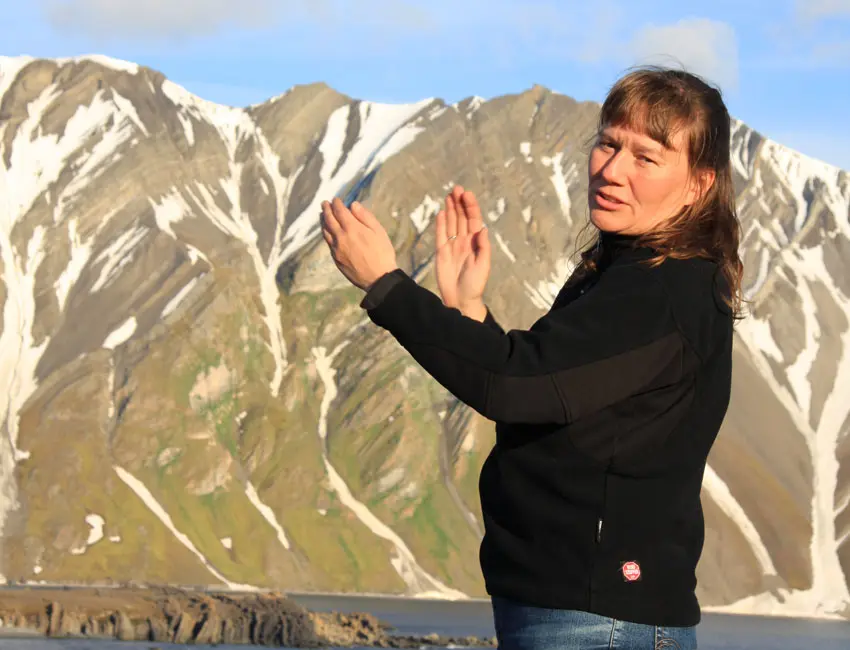UNIS partner in new Centre of Excellence in Education

AG-209 lecture in the field. Photo: Maria Jensen/UNIS.
Top image: UNIS Arctic geology students have lecture out in the field. Photo: Maria Jensen/UNIS.
iEarth becomes one of the new Norwegian Centre of Excellence in Education. This is the second Centre of Excellence in Education where UNIS is partner.
12 December 2019
Press release from University of Bergen and UNIS
The Centre for Integrated Geosciences Education (iEarth) was awarded the Centre of Excellence in Education (SFU) on December 12. iEarth is a national collaborative project led by the University of Bergen and aims to develop and develop teaching in the geosciences at the University of Oslo, the University of Tromsø, the University of Bergen and the University Centre in Svalbard (UNIS).
It is the Directorate for Internationalization and Quality Development in Higher Education (DIKU) that awards the status. The status as SFU is awarded to environments that can already show excellent quality and innovative practice in education, and which have good plans for further development and innovation.
iEarth becomes one of four new centres. 21 different centres applied for the status.
Will change the education
Geoscience education is a cornerstone of Norwegian society, rooted in Norway’s energy and resource-based industry and a key to social and environmental safety. Yet, geoscience is changing, and caused by climate change, a changing energy landscape and resource utilization, we clearly see the dependence between our society and our planet.
Through iEarth, we are putting together a national consortium with a broad international network to change geoscience education in Norway. We want to promote a student-focused and innovative learning environment for tomorrow’s geoscience students to meet complex societal challenges and opportunities.
“This is a unique opportunity to make a boost for the geosciences at a time when our expertise is needed in ever-new areas. We have something as rare as a national consortium, which means that we can really make a difference both nationally and internationally”, says Jostein Bakke, professor at University of Bergen and Head of the iEarth consortium.
The UNIS Arctic geology and Arctic geophysics departments are very excited about iEarth being funded and by being part of this. iEarth represents a very important national collaboration on developing the next generation geoscientists for Norway, and UNIS will play a very important role in this, being responsible for the field learning development.
From the UNIS Arctic Geology department professor Hanne Hvidtfeldt Christiansen, together with professor Andy Hodson and associate professors Maria Jensen and Lena Håkansson, has led the UNIS part of the application process.
“In a time when geoscience in Norway is seeing a drop in student numbers, we of course hope that the work in iEarth will reverse this development. iEarth will allow more students to be trained in geoscience, and thus fill all the needs for geoscience in society”, says professor Hanne Christiansen, who is co-leader of the iEarth consortium.
“This shows the large focus at UNIS in developing our field- and research-based education”, Christiansen says
Students deserve good teaching
“We need to have more environments that take the lead in developing varied, high-quality teaching, because all students deserve to receive good teaching. Society and working life must also have good candidates from universities and colleges. Therefore, it is gratifying that we now have several centres for excellent education in place,” said Minister of Research and Higher Education, Ms. Iselin Nybø (Lib.), in a press release from DIKU.
The centres have a particular responsibility for disseminating knowledge and practices that lead to increased quality in higher education, both inside and outside their own institution.
Three UNIS departments are now part of two educational environments with SFU status. bioCEED, also headed by the University of Bergen, received the status in 2013 and the UNIS Arctic Biology department is represented in the centre’s board.
Concrete plans
The SFU grant ensures iEarth NOK 83 million from both the institutions and DIKU, spread over 5 years. This money will go towards ensuring a solid teaching environment at the four institutions, including the appointment of an Education Chair at each institution responsible for the implementation and follow-up of iEarth projects.
New PhD and postdoctoral positions will also be available at each institution. This will be the basis for a Nordic Research School in geoscience didactics. In addition to various settings, an internal project pot will be set up where both students and staff with good ideas within educational development can apply for funding. The goal is to develop a national environment for geoscientific teaching and a lasting national cultural change that equates teaching in higher education with research.
